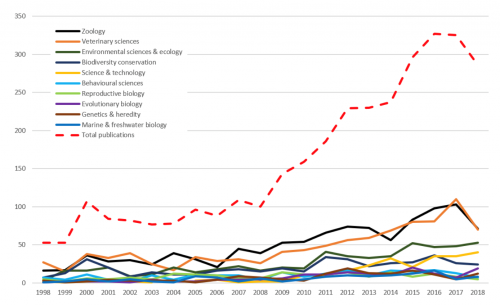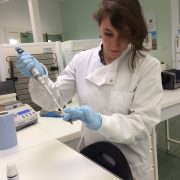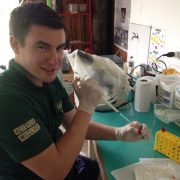Alongside conservation and education, one of the core tenets of a modern zoo is research – but what exactly is the contribution to science from EAZA zoos? This new piece of fascinating research involving Chester Zoo’s Research officer, Dr. Lindsay Eckley, set out to find out just that.
In this multi-institutional collaboration, comprising of researchers from Chester Zoo, Copenhagen Zoo, and Manchester Metropolitan University, the research team reviewed over 3,300 publications from 291 institutions, which included research topics such as zoology, veterinary sciences, and environmental sciences and ecology. While they found that 65% of institutions had contributed to peer-reviewed science, seven institutions, including Chester Zoo, made up 37% of all publications!
The study also identified a general increasing trend in the number of publications by EAZA members, notably with a more than three-fold increase between 2008 and 2018.
“This paper highlights the tremendous value of zoo research to conservation and the significant contribution that European zoos in particular make to doing practical research that is directly applied to solving welfare and conservation problems on the ground.” – Dr. Simon Dowell, Chester Zoo’s Science Director.
By ensuring that research goes through the peer-review process, zoo researchers ensure their work is of high scientific quality. However, while the study focused on peer-reviewed publications, the authors also highlight the many contributions that zoos have to science outside of peer-reviewed publications through things like contributions to magazines, book chapters, and Best Practice Guidelines, through training opportunities, and by opening their facilities and animal collections to external researchers.
“Scientific evidence is vitally important for making decisions to benefit in-situ and ex-situ conservation. However, to be applied and make a difference on a wider scale, evidence needs to be trustworthy and disseminated. This analysis has shown that zoos and aquaria have the ability to publish valid research in a variety of relevant subjects, but there is room for more. I believe that zoos and aquaria are in a unique position to lead on scientific research and they should be supported to share the results.” – Dr. Lindsay Eckley, Chester Zoo’s Research Officer.

Figure 1. The number of publications in the top 10 research areas from EAZA zoos between 1998 and 2018.
Read the published research here
OUR TEAM OF EXPERTS WORK IN SIX REGIONS AROUND THE GLOBE – REPRESENTING SOME OF THE PLANET’S MOST BIODIVERSE HABITATS. Discover more about our SCIENCE AND CONSERVATION work.



